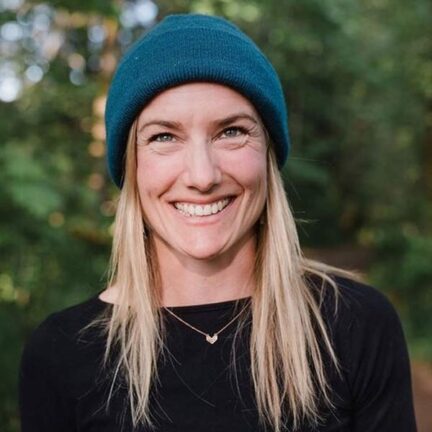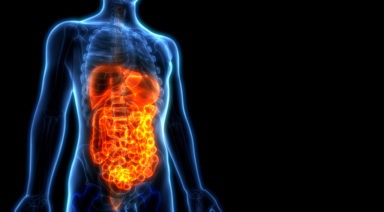Why Am I Starving So Early After Breakfast

Every morning I eat my breakfast of organic whole grain cereal, skim milk and blueberries. I’m trying to be healthy, but when I get to work an hour later I’m already starving. I feel like I have such a big appetite! What can I do?
First I want to say that what you are experiencing is extremely common. I would say that the majority of my nutrition clients come to me with this exact issue. And I understand why – eating a breakfast of organic cereal, skim milk, and blueberries seems like the “perfect” healthy breakfast straight out of all the diet books and magazines.
But often this meal leaves us with a blood sugar spike – a fast rise in blood sugar that falls quickly and leaves us feeling hungry soon after. This situation is the common paradox that occurs when we try to eat healthy: FIRST we change our breakfast to one with “healthier” ingredients. BUT because these “healthier” ingredients are missing some important components, we feel unsatisfied soon after eating. THEN we end up eating more than usual. And EVENTUALLY we feel guilty for being “a person with a big appetite”. How does this happen?
Let’s take a closer look at the breakfast…
-
Organic Whole Grain Cereal = A complex carbohydrate with fiber – often has added sugar (cane sugar is just another name for sugar) which is a simple carbohydrate.
-
Skim Milk = A simple carbohydrate with the fat removed.
-
Blueberries = A simple carbohydrate (with an abundance of antioxidants).
What we have here are a lot of carbohydrates. Energy-providing and essential to the functioning of the body, carbohydrates are made of sugar. When sugar enters the body it eventually reaches the blood stream thereby causing a rise in blood sugar. Now a rise in blood sugar is not a bad thing – it is what gives energy to the body. It is when blood sugar rises too fast that is becomes a problem. Refined sugars, such as white sugar and brown sugar, cause the biggest spike. Simple sugars, such as those in honey and fruit, are next on the list, and complex carbs, such as whole grains, are last because their linked sugars take time to break down.
What can you do to slow down the rise of blood sugar? How can you feel satisfied for longer after a meal? Three words: fiber, fat, and protein. These three magic nutrients are the answer. Let’s take a closer look at the breakfast and see what can be done to add these three so it lasts longer…
-
Organic Whole Grain Cereal:
- Contains fiber so will help
- Some have sugar added so look for cereals that do not have “cane sugar”, “cane juice”, “organic cane sugar”
- OR cook your own hot cereal using whole grains such as oats, amaranth, or millet (have a lot of fiber and are not refined or processed)
- Or consider eating eggs when you really need your meal to last (contain fat and protein)
-
Skim Milk:
- Made of simple sugars with the fat removed
- An excellent alternative is a plain, whole fat (as nature intended), non-homogenized yogurt – the fat will help slow down the release of the simple sugars AND the yogurt will provide probiotics to help your digestion
-
Blueberries
- A fantastic source of antioxidants and fiber
- I wouldn’t change a thing here BUT I would consider adding one of the following ingredients to help the meal be even more satisfying:
- Almonds, hazelnuts, walnuts, or pecans
- Flax, hemp or pumpkin seeds
- Coconut flakes
Do not be afraid of adding fat, protein and fiber to your diet. In the end, if you listen to your body’s hunger signals and eat when you’re hungry and finish when you’re satisfied, you will end up eating less – and enjoy the process much more along the way!
Novak Djokovic Credits Diet For His Success

One of the familiar faces in TRANSCENDENCE, the new 5 part docu-series coming exclusively to FMTV, is 14 time Grand Slam tennis champion, Novak Djokovic. In Episode 1, titled ‘What’s In Our Food?’, Novak shares how a change to his diet was the catalyst to his 2011 comeback.
In his deeply personal interview, Djokovic shares his struggles on and off the court, which lead him to go down to Jo-Wilfried Tsonga at the 2010 Australian Open. From respiratory problems, an inability to cope with the heat, endurance problems, blurry vision, and a slew of other performance issues, Djokovic was fighting a losing battle with himself.
“I’ve experienced, prior to 2010 Australian Open, many struggles on the court… even though I was training hard, I felt like I was losing that fuel in my tank,” he shares.
Embarking on a life-changing journey with the help of fellow Serb, Dr. Igor Cetojevic, Djokovic found the best fuel for his body, and he hasn’t looked back since. The results were swift and impactful, with the tennis star winning ten tournaments and being crowned world number 1 within the next 12 months.





































